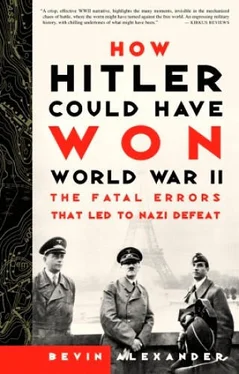Cooper, Matthew. The German Army 1933–1945. New York: Stein and Day, 1978. Corum, James S. The Luftwaffe: Creating the Operational War, 1918–1940. Lawrence: University Press of Kansas, 1997.
Craig, Gordon A. The Politics of the German Army 1640–1945. New York: Oxford University Press, 1964.
Crane, Conrad C. Bombs, Cities, and Civilians: American Airpower Strategy in World War II. Lawrence: University Press of Kansas, 1993.
van Creveld, Martin. Hitler’s Strategy: The Balkan Clue. Cambridge, U.K.: Cambridge University Press, 1973.
Cross, Robin. Citadel: The Battle of Kursk. London: Michael O’Mara Books, 1993; New York: Barnes & Noble, 1994.
Cunningham, Adm. Lord. A Sailor’s Odyssey. London: Hutchinson, 1951.
Dahms, Hellmuth Günther. Die Geschichte des Zweiten Weltkrieges. München, Berlin: F. A. Herbig, 1983.
Dallek, Robert. Franklin D. Roosevelt and American Foreign Policy, 1932–1945. New York: Oxford University Press, 1979.
Dallin, Alexander. German Rule in Russia. New York: Macmillan, 1957; London: 1983. Das Deutsche Reich und der Zweite Weltkrieg. Vols. 2–6. Produced by das militärgeschichtlichen Forschungsamt. Stuttgart: Deutsche Verlags-Anstalt, 1979–1983. D’Este, Carlo. Decision in Normandy. New York: Harper Perennial, 1994.
Douhet, Giulio. The Command of the Air. New York: Coward-McCann, 1952; London: Faber, 1943.
Ehrman, John. Grand Strategy. Vol. 5. London: HMSO, 1956.
Eisenhower, Dwight D. Crusade in Europe. New York: Doubleday, 1948; London: Heinemann, 1949.
Ellis, John. Brute Force: Allied Strategy and Tactics in the Second World War. New York: Viking, 1990.
———. The Sharp End: The Fighting Man in World War II. New York: Scribner’s, 1980. Ellis, L. F. Major. The War in France and Flanders, 1939–1940. History of the Second World War. London: HMSO, 1953.
English, John A., and Bruce I. Gudmundsson. On Infantry. Westport, Conn.: Praeger, 1994.
Erickson, John. The Soviet High Command: A Military-Political History. New York: St. Martin’s, 1962.
———. The Road to Stalingrad. London: Weidenfeld and Nicolson, 1975; New York: Harper & Row, 1975.
———. The Road to Berlin. New York: Harper and Row, 1983.
Eubank, Keith. Summit at Teheran. New York: William Morrow, 1985.
Feiling, Keith. The Life of Neville Chamberlain. London: Macmillan, 1946.
Finney, Patrick, ed. The Origins of the Second World War. New York: Oxford University Press, 1997.
French, David. The British Way of Warfare. London: Unwin Hyman, 1990. Fuller, J. F. C. A Military History of the Western World. 3 vols. Reprint of 1956 ed. New York: Da Capo Press, n.d.
Gilbert, Martin. The Second World War. New York: Henry Holt, 1989.
Glantz, David M., and Jonathan House. When Titans Clashed: How the Red Army Stopped Hitler. Lawrence: University Press of Kansas, 1995.
Goerlitz, Walter. History of the German General Staff. New York: Praeger, 1953. Goldhagen, Daniel Jonah. Hitler’s Willing Executioners: Ordinary Germans and the Holocaust. New York: Alfred A. Knopf, 1996.
Goutard, Adolphe. The Battle of France, 1940. New York: Ives Washburn, 1959. Greenfield, K. R., ed. Command Decisions. Washington, D.C.: Office of the Chief of Military History, 1960.
Guderian, Heinz. Panzer Leader. New York: E. P. Dutton, 1952.
Gudmundsson, Bruce I. On Artillery. Westport, Conn.: Praeger, 1993.
———. Stormtroop Tactics. Westport, Conn.: Praeger, 1989, 1995. Halder, Gen. Franz. Diaries. Privately printed. Copyright Infantry Journal (U.S.A.), 1950.
Harrison, Gordon A. Cross-Channel Attack. United States Army in World War II. Washington, D.C.: Office of the Chief of Military History, 1950, 1977.
Hastings, Max. Das Reich. Resistance and the March of the 2nd SS Panzer Division through France: June 1944. London: 1981.
———. Overlord: D-Day and the Battle for Normandy. New York: Simon & Schuster, 1984.
———. Victory in Europe: D-Day to V-E Day. Boston: Little, Brown, 1985.
Hinsley, F. H., et al. British Intelligence in the Second World War. London: HMSO, 1979. Horne, Alistair. To Lose a Battle: France 1940. Boston: Little, Brown, 1969; London: 1969.
Howard, Michael. The Mediterranean Strategy in the Second World War. London: Weidenfeld and Nicolson, 1968.
Howe, George F. The Mediterranean Theater of Operations: Northwest Africa: Seizing the Initiative in the West. Washington, D.C.: Office of the Chief of Military History, 1957.
Irving, David. The Trail of the Fox: The Search for the True Field Marshal Rommel. New York: E. P. Dutton, 1977.
Keegan, John. The Second World War. New York: Penguin Books, 1989.
———. Six Armies in Normandy. New York: Penguin Books, 1994.
Kennedy, Paul. The Rise and Fall of Great Powers. New York: Random House, 1987. Kiesling, Eugenia C. Arming Against Hitler: France and the Limits of Military Planning. Lawrence: University of Kansas Press, 1996.
Kimball, Warren F. Forged in War: Roosevelt, Churchill and the Second World War. New York: William Morrow, 1997.
Kippenberger, Maj. Gen. Sir Howard. Infantry Brigadier. New York and London: Oxford University Press, 1949.
Knappe, Siegfried, and Ted Brusaw. Soldat: Reflections of a German Soldier, 1936–1949. New York: Orion Books, 1992.
Krausnick, Helmut, and Hans-Heinrich Wilhelm. Die Truppe des Weltanschauungskrieges. Stuttgart: Deutsche Verlags-Anstalt, 1981.
Levine, A. J. The Strategic Bombing of Germany 1940–1945. Westport, Conn.: 1992.
Lewin, Ronald. Ultra Goes to War: The Secret Story. New York: McGraw-Hill, 1978.
———. The American Magic: Codes, Ciphers, and the Defeat of Japan. New York: Farrar Straus Giroux, 1982.
Liddell Hart, Capt. Basil H. The Defense of Britain. London: Faber, 1939. ———. The Other Side of the Hill. London: Cassell, 1951. (Shortened version published as The German Generals Talk, New York: William Morrow, 1948.)
———. The Tanks: The History of the Royal Tank Regiment and Its Predecessors. 2 vols. New York: Praeger, 1959; London: Cassell, 1959.
———. History of the Second World War. New York: Putnam’s, 1971.
Linklater, Eric. The Campaign in Italy. London: HMSO, 1951.
Lucas, James. Battle Group: German Kampfgruppen Action of World War Two. London: Arms and Armour Press, 1993.
———. Panzer Army Africa. San Rafael, Calif.: Presidio Press, 1978.
MacDonald, Charles B. A Time for Trumpets: The Untold Story of the Battle of the Bulge. New York: William Morrow, 1985.
Man, John. D-Day Atlas. New York: Facts on File, 1994. von Manstein, Erich. Lost Victories. Chicago: Henry Regnery, 1958.
Martel, Lt. Gen. Sir Gifford. An Outspoken Soldier. London: Sifton Praed, 1949. Matloff, Maurice, and Edwin M. Snell. The War Department: Strategic Planning for Coalition Warfare. Washington, D.C.: Office of the Chief of Military History, Department of the Army, 1957. Same title by Matloff for 1943–1944, Washington, D.C.: 1959.
McGuirk, Dal. Rommel’s Army in Africa. Shrewsbury, England: Airlife Publishing, 1987. von Mellenthin, F. W. Panzer Battles. Norman: University of Oklahoma Press, 1956. Messenger, Charles. The Art of Blitzkrieg. London: Ian Allen, 1976.
The Memoirs of Field-Marshal Viscount Montgomery of Alamein. Cleveland: World Publishing, 1958.
Читать дальше


![Джонатан Димблби - Barbarossa - How Hitler Lost the War [calibre]](/books/385421/dzhonatan-dimblbi-barbarossa-how-hitler-lost-the-w-thumb.webp)









